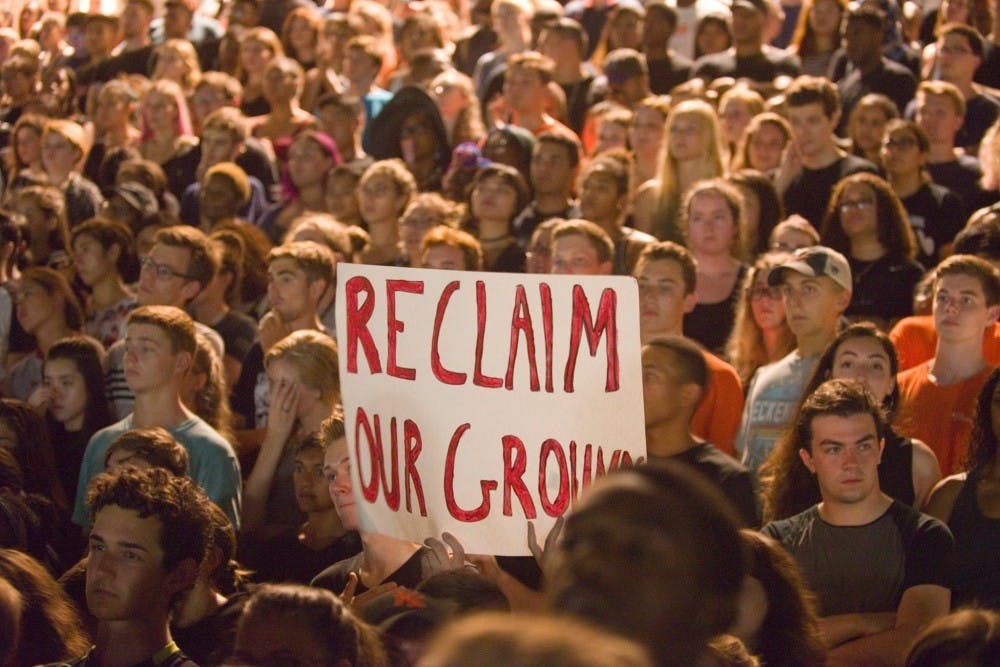There is much to criticize about the Concert for Charlottesville. Last Sunday, the activist organization Solidarity Cville came out with a strong condemnation of the weekend’s unity concert in response to the acts of terror committed by white supremacists on Aug. 11 and 12. Declaring “No Unity Without Justice,” they called for a greater focus on rejecting white supremacy and questioned the leadership of individuals like University President Teresa Sullivan and Charlottesville Mayor Mike Signer. Many of these important criticisms, however, were driven by an implicit suggestion that students can only respond to Aug. 11 and 12 with direct action. We should have nothing but respect for those who put their bodies on the line to resist systemic oppression. But we must never stop respecting other forms of resistance as well.
Representing both Charlottesville community members and students of the University, Solidarity Cville raised many criticisms that absolutely ring true when thinking about the concert’s and the University’s shortcomings. The full list of the “No Unity Without Justice” demands is available online, and it’s an important read. One of their most salient points is that we must reject the effort to rebrand. Students at the University have a perhaps unparalleled ability to advertise on behalf of their institution at the drop of a hat. Promotional jargon for the University –– from Honor to Grounds to Student Self-Governance –– is always at the tip of our tongues. Branding is central to the student experience here, and thereby poses a unique threat to efforts at radically reevaluating policy and procedure. We must make every effort to continue feeling the shame of the white supremacist marches rather than using the concert as an excuse for moving on.
I do, however, take issue with the language Solidarity Cville uses to implicitly criticize all those who have not participated in direct action resistance efforts. Solidarity Cville’s “False Unity” flyer begins with the following sentence: “We represent the front-line activists, students, and community organizers who have been confronting white supremacy in streets and board rooms throughout Charlottesville.”
This is true. Solidarity Cville has been confronting white supremacy in the arenas they list –– streets and board rooms and other spaces for protest. But these responses to Aug. 11 and 12 are not the only avenues by which students can forge a more equitable future. I’m reminded at this point of second-year student Natalie Romero’s comments at the Aug. 21 “March to Reclaim Our Grounds.” Romero was attacked while protesting white supremacy on Aug. 12, and she –– along with all other students present for those protests –– is an undeniable hero. At the “March to Reclaim Our Grounds,” though, Romero said that “she wished more students had turned out to counter-protest.” “Where were you all?” I remember her asking.
More protesters is, of course, a good thing for resistance. But the suggestion was that all students had an obligation to be present on Aug. 11 and 12, regardless of their mental health or personal safety concerns or any of the other factors that differentiate one person’s skill set from another’s. The False Unity video denounces the hypocrisy of supporting “city officials and University presidents over those who actually show up to defend the community.” I agree wholeheartedly that student organizers should be supported and institutional leaders should be held responsible, at least in part, for Charlottesville’s August violence. But the phrase “those who actually show up” gives me pause. There’s a judgement there –– a suggestion, again, that direct action is the only valuable action. It suggests that other forms of resistance are cowardly or second-tier.
Aug. 11 and 12 have left us with many difficult questions to consider. Among these are questions of how to appropriately respond to acts of terrorism, and how a person should be expected to respond to trauma in general. It seems clear to me, at least, what the answer should not be to these questions. Namely, that all students must respond in the same way. This idea ridicules the real challenges students might face when considering potentially dangerous situations. What about the student who suffers from panic attacks in large crowds? What about the minority student who is rightfully concerned about police brutality?
It also disregards all the good that is done in other ways. It minimizes efforts like Madison House’s #DearYoungPerson campaign and other attempts to spread hope or press for change by other means.
Front-line activism is vital to the work of challenging systems of oppression. It is not, however, the only way to fight back, nor should it be. Solidarity Cville should be praised for its courage in challenging the presiding opinion regarding the intentions and effects of the Concert for Charlottesville. And it should work to value and support the full spectrum of strategies employed by students to Reclaim Our Grounds and fight white supremacy.
Jack Chellman is a Viewpoint writer for The Cavalier Daily. He can be reached at opinion@cavalierdaily.com.







